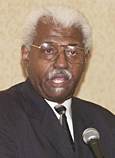sbc_black_62303
Posted 6/18/03
SBC: Black History Project focuses on Black leaders
PHOENIX (BP)–African-American pastors can become leaders among Southern Baptists when they get involved enough to be known and respected, said E.W. McCall, longtime pastor of St. Stephen Baptist Church in La Puente, Calif.
| Lott Carey, a freed slave supported by Baptists in Richmond, Va., inaugurated missions work in the African country of Liberia in 1821. |
 |
| George O. McCalep Jr., president of the African American Fellowship of the Southern Baptist Convention. |
McCall offered his advice during the inaugural seminar of the Black History Project June 14 at Bethesda Community Baptist Church in Phoenix. The seminar was hosted by the Black Southern Baptist Denominational Servants Network.
“Get involved on the local level,” McCall said. “Stay involved when you're popular and when you're not.”
He urged African-American pastors to be a friend and be friendly, even when ignored by whites or castigated by blacks.
“Show up at local, associational, state and national events,” he said. “… And bring your people with you. There's something to be said for the theology of presence, what you do, the way you carry yourself.”
He added: “When you're not given opportunities, you can't give up. You can't get discouraged.”
Once elected to leadership positions, African-American leaders must keep those denominational roles a priority, he advised. “You must serve well when elected. You're there to help, not hinder. Listen twice as much as you talk. Be known as a team player. Do your part. Carry your load.”
He also urged being more “Christ-centered” than “Afro-centric.”
Roy Cotton, a church starting strategist with the Baptist General Convention of Texas, was one of five co-chairmen for the seminar. Cotton served this year as president of the Black Southern Baptist Denominational Servants Network.
“For the first time, we come together to focus on the history of African-Americans in the Southern Baptist Convention,” Cotton said in his opening remarks.
The story of Southern Baptists and blacks is a tale of the “good, the bad and the ugly,” said Kevin Smith, another event co-chairman and a doctoral student at Southern Baptist Theological Seminary.
He urged telling the whole story, even the bad parts. In time, he said, “we'll get to the point of God's people working together for the exaltation of Christ.”
Smith called for the denomination to financially support the study of African-Americans' involvement in the Southern Baptist Convention. Until now, he said, it has been perhaps a chapter, paragraph or even footnote in what has been written in Southern Baptist history.
George McCalep Jr., pastor of Greenforest Community Baptist Church in Decatur, Ga., and president of the SBC's African-American Fellowship, recounted the formation of the fellowship, while Cotton spoke on the formation of the Denominational Servant's Network.
Leon May, pastor of Greater Friendship Baptist Church in Anchorage, Alaska, talked about that church's past, present and future. Greater Friendship in 1951 was the first African-American congregation to join the SBC in the 20th century. In an era of separatism, many African-American churches had left the SBC by the 1970s.
Andre Punch, church growth and African-American consultant with the BGCT, moderated a panel discussion on seminary education. Panel participants were Smith; McCalep; McCall; Leroy Gainey, pastor of First Baptist Church of Vacaville, Calif.; and Sadie McCalep, George McCalep's wife and coordinator of career/technology education in the Atlanta school system.
Gainey encouraged black Baptists to “do more writing” to get their story taught in seminary classrooms. “If you don't put it in print, it won't get taught,” he said.
At the seminar, participants received the first issue of the Journal of African American Southern Baptist History produced by the Denominational Servants Network.
At the annual meeting of the servants network, Cotton called on his peers to “risk to win the next generations.”
“New challenges call for new strategies. … Vision and values are not negotiable, but goals and strategies are negotiable and must be adapted to new situations,” he said. “Our message does not change, but our methods do.
Some people are cop-outs, hold-outs and drop-outs, he noted, but denominational servants are “all-outs who set goals, commit to them and pay the price to reach them.”
Currently, about 200 African-Americans are employed by Southern Baptist Convention agencies and state Baptist conventions. The Denominational Servants Network brings them together for fellowship and networking.
Officers elected for 2003-04 are President Rosevelt Morris, director of the South Carolina Baptist Convention's office of prayer and spiritual awakening; Vice President Dennis Mitchell, director of the SBC North American Mission Board's church multiplication team; Secretary Ken Ellis, associate director of institutional chaplaincy for NAMB; Treasurer Maxie Miller, church planting coordinator in the Florida Baptist Convention's African-American ministries division; and Parliamentarian Michael Evans, director of African-American ministries for the BGCT.
The network presented its Emmanuel McCall Denominational Servant Award to Tom Kelly, who was director of the California Southern Baptist Convention's black church relations department from 1982 to 2003.
Hall of Servanthood awards for “outstanding career contributions” were given to Emmanuel McCall, Bill Johnson and Willie Simmons, three men who pioneered Southern Baptist work among African-Americans.
The Faithful Servant Award was given to Sid Smith, director of the Florida Baptist Convention's African-American ministries.